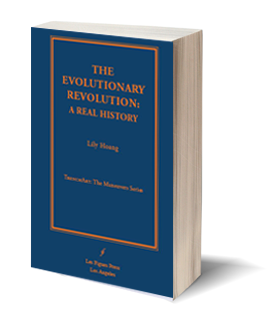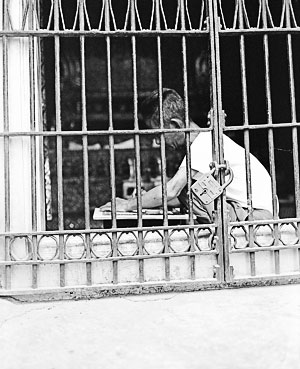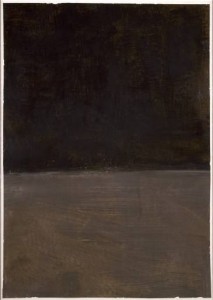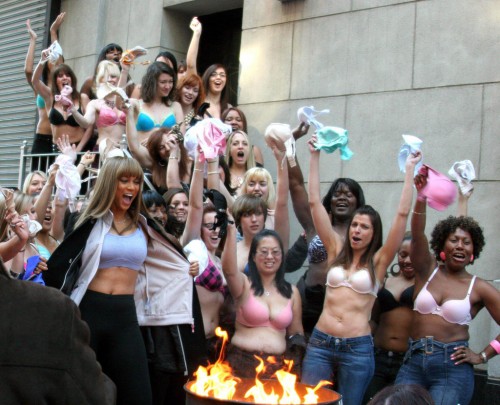The Evolutionary Revolution
Lily Hoang’s new book, The Evolutionary Revolution, is now available from Les Figues Press via SPD. Super excited for this one…

What if evolution was decided by committee and revolution by mere chance? What if man was a subspecies? What if man, as a subspecies, was woman, with tiny red wings on her thighs and pasted shut eyes? What if she flew in the sky or slept on the moon, and what if the earth was a saltless water world filled with forgetful, vengeful two-headed mermen? Welcome to THE EVOLUTIONARY REVOLUTION, a fabulist story of sense-making for the 21st century. In this twinning tale of freak shows and prophets, tract homes and impending doom, award-winning author Lily Hoang collapses time and narrative into a brilliant novel of beginnings and ends, where sentences undo each other and opposites don’t cancel each other out. As Anna Joy Springer notes in the book’s introduction, “In literature, as sometimes in life, it’s a scary kind of fun to be manipulated by a pretty girl, who changes the game on a whim.”
excerpt at The Collagist * audio reading at Apostrophe Cast * excerpt at Harp & Altar
Damn.
 Here’s something to read:
Here’s something to read:
“The young ones called each other out from their cells. Set to set, block to block, nation to nation. They called each other soldier. Six pop, five drop, nines and gats and gauges. Greetings and threats indistinguishable in the voices of monster children.”
—Firework, Eugene Marten, Tyrant Books
So, this is from the galley, which arrived on my desk at work today. I read the first 20 or so pages in a doctor’s waiting room. The first pages take place in a jail.
When you get a galley, it reminds you—the reader—that it is an uncorrected proof, and that some small changes may be made, and that you should check with the publicity department or the finished book before quoting from it somewhere.
I didn’t do that. I’m not going to do that. Read that paragraph—what would you change?
Seriously, Gian. If you change anything in that paragraph, I’m coming for your ass.
Leszek (Lech) Jankowski wrote the music for the Brother’s Quay film “The Street of Crocodiles.” Here is a short blog post that includes a link to an mp3 of that soundtrack. Here’s his website. Right now, my head sounds like this guy’s music. If you need me, I’ll be in bed.
Art v. Politics: Not About Privilege
 I’ve put my favorite Susan Sontag quotation in comment fields here, but I’m going to recall it again:
I’ve put my favorite Susan Sontag quotation in comment fields here, but I’m going to recall it again:
And the wisdom that becomes available over a deep, lifelong engagement with the aesthetic cannot, I venture to say, be duplicated by any other kind of seriousness. Indeed, the various definitions of beauty come at least as close to a plausible characterization of virtue, and of a fuller humanity, as the attempts to define goodness as such.
I believe this with every bit of me. And I am completely convinced that, as egregiously privileged as I am, this is not a privileged position. Susan Sontag had radical left politics, but she put the aesthetic first. She’s a lot smarter than me, but I’m still going to try to make some sense of that position here.
Politics are terminal. They are finite. We might say we are interested in raising questions when we talk about gender or race or other categories that are defined and upheld by politics. But politics is really about finding answers. This has its place, but its place is not in art.
Artists know that finding real answers is not possible in this world. The failure of politics to recognize this fact is why the lasting thing from any culture has been its expression. Desperate people turn to story, turn to verse, performance, art. When nothing is assured, when help doesn’t come, when standards aren’t met and good people suffer, the only thing left is to confront mystery, to confront tragedy and eternity.
The aesthetic means simply the representation of all this mystery, tragedy, eternity without the dissembling claim of wrapping them up neatly. Keying into the aesthetic instead of the political in a work of art is about asking what choices of form the art-maker made to best help the audience to access the mystery, the eternity. To help the audience feel human.
“Speed of light.”
httpvh://www.youtube.com/watch?v=wLnmvseCseI
But What About the Nipples? A Nice Conversation (Pt. 2)

Blake Butler, Kate Zambreno, Amy King and I recently had a nice, interesting, and lengthy conversation about gender, publishing and so much more, prompted by lots of things including the recent, and largely excellent discussion in Blake’s “Language Over Body” post about the second issue of We Are Champion. Over the next three days, I’m going to post that conversation and we all hope you guys join in on our conversation and share your thoughts. You can find Part 1 here.
Amy: We’ve got our rooms and we’re writing – we are no longer invisible, unless editors and prize committees try to render us so. My response was an attempt to point out the other option, which is to be inclusive (which means showcasing possibly disparate work that could be in dialogue), via a new mag, PARROT, that includes work fitting the aforementioned bill:
“PARROT will print the work of Stephanie Rioux’s My Beautiful Beds, Harold Abramowitz’s A House on a Hill (House on a Hill Part 1), Amanda Ackerman’s I Fell in Love with a Monster Truck, Will Alexander’s On the Substance of Disorder, Amina Cain’s Tramps Everywhere, Allison Carter’s All Bodies Are The Same and They Have The Same Reactions, Kate Durbin’s Kept Women, Joseph Mosconi’s But On Geometric, Amaranth Ravva’s Airline Music, Mathew Timmons’ Complex Textual Legitimacy Proclamation, Allyssa Wolf’s Loquela as well as the work of Michelle Detorie, Vanessa Place, Brian Kim Stefans and others…”
I realize this number counting feels isolated and is usually defended as ‘accidental’. Just see PW’s note on their all male “Top Ten” list for 2009. But what gets lost when we don’t query such disproportionate representation is that the interests and views and styles that men write in are what we all: male, female, and every other gender get conditioned to, starting with child lit on up to college “classics.” Such lack parallels why the Wall Street fuck up might have been prevented, or at least lessened. If variety is the spice of life, shouldn’t that hold true for the literary landscape as well? There should be a symphonic cacophony, no?
At We Who Are About to Die, Daniel Nester has compiled 13 lessons about doing a book (writing, promoting, etc). Really worthwhile stuff, from the funny “Don’t read more than 15 minutes [at a reading]. Any longer than that is a hostage situation.” to a point that I needed to hear at this exact moment: “Remember the times you were writing the book and had rushes of joy from putting words and sentences together. “
Sex and Brevity, Fracture and Complexity
Savannah Scholl Gruz questions if the elements of fiction are obsolete in a really interesting post on her blog. She asks, “But why, too, are stories so often about empty sex and blow jobs? Why are so many of them full of violence and figurative blind corners.” Her discussion expresses a real concern over the highly sexualized, fragmented short story and she also notes that, “Maybe we are the decade of fractured, sexual narratives in the same way that we have, in many ways, become a fractured and highly sexualized culture.”
As a writer who often writes sexual narratives, sometimes fractured in nature, but often times, linear and complex, I’m pretty intrigued by her commentary. Savannah asks if the proliferation of highly sexualized work is a deeper commentary on our culture, a reflection of this moment in time but I would say that literature has always been highly sexualized. It’s only the nature of highly sexualized work that continues to evolve. Similar concerns as the ones Savannah shares in her post were raised at the end of the 19th century, for example. Elaine Showalter’s Sexual Anarchy is a great book that looks at the evolving sexual culture of the fin de siecle and how those cultural changes manifested themselves in literature and popular culture.
InDigest has a new issue, including 7 broadsides from the new poems that will appear in the rereleased edition of CAConrad’s incredible The Book of Frank, coming out in expansion this year from Wave. Love.

